Mobile Pastured Eggs:
Everything You Need To Know
If you are a farmer, or if you follow current food trends, you know how much controversy there is about food.
Customers and experts are constantly asking how it was raised, if it is processed, if it is healthy, whether it's organic, and so on.
Eggs and dairy seem to be two food products that are always on the food critic’s rollercoaster. One week they are healthy, one week they are unnecessary fats, and then the next week someone else has another critique or praise for them.
In the egg market, however, one trend continues to gain traction: If you want healthy eggs, buy them from egg farms that have healthier chickens and more sustainable methods.
This has resulted in the egg industry using terms like “cage-free,” “free-range,” and “pasture-raised.”
But there is a problem.
Many of these labels are misleading, and many people don’t know what they actually mean.
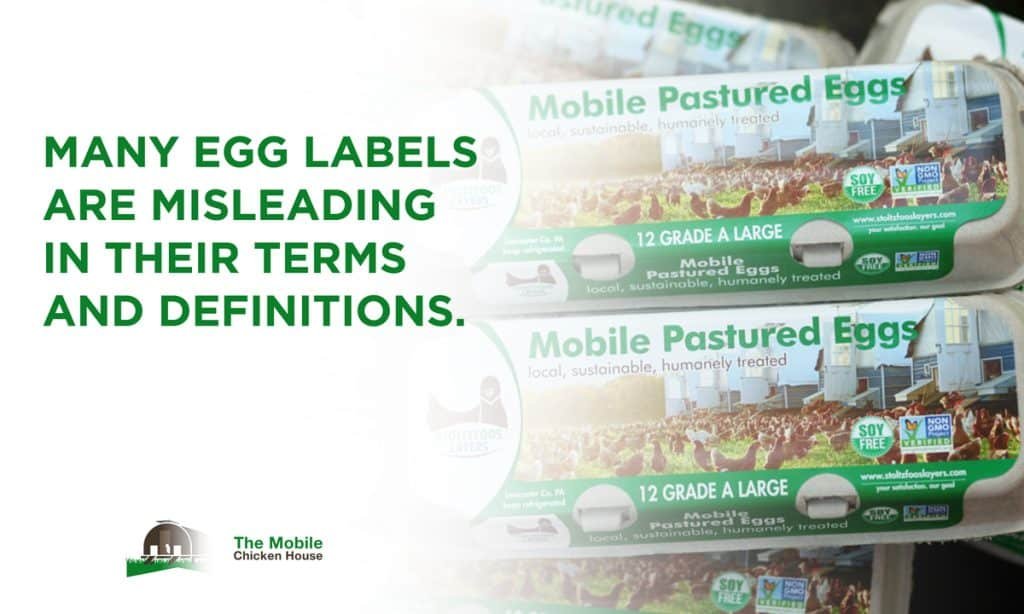
Rising from these different definitions and egg farming operations, there is a new way to farm and gather eggs: mobile-pastured eggs.
Mobile-pastured eggs, which use mobile chicken houses, are relatively new in the United States. Many egg farmers don’t know much about them or how they are different from other egg operations, particularly pasture-raised operations.
So what are mobile-pastured eggs?
In this article, we are going to take a deep dive to answer this question. We will look at what mobile-pastured eggs are, how they differ from pasture-raised eggs, and why they are the healthiest option for the eggs, the hens, humans, and the land.
Ready to get started?
Alright, let’s go!
1. What Are Mobile-Pastured Eggs?
When many people think of a “chicken house,” they think of the large, long commercial barns which dot the hillsides and landscapes, especially in the Northeast and Eastern United States.
Sadly, these commercial egg and chicken operations are often the furthest thing from healthy, sustainable egg farming.
That’s where mobile-pastured eggs enter the picture - they are a healthy, quality-driven, sustainable alternative to the standard commercial egg operation.
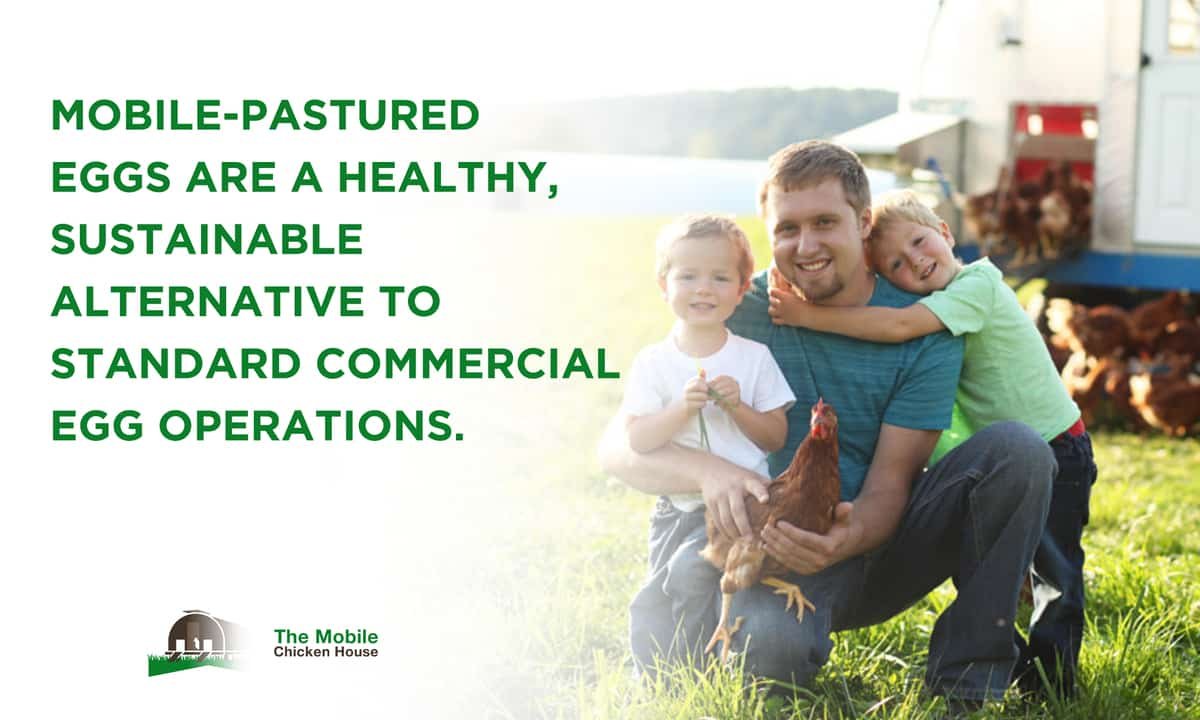
Mobile-pastured eggs are produced by chickens kept in a mobile chicken house.
So what is a mobile chicken house?
In the simplest terms, it is a chicken house that is mobile!
Specifically, mobile chicken houses are chicken houses designed to allow chickens unlimited access to the outdoors and the organic matter available in the outdoors. This includes grass, bugs, worms, and other insects.

To do this, the houses need to be designed in a way where they can be easily moved around with a pickup, small tractor, or even a UTV if adequately sized.
Mobile chicken houses should be moved regularly. “Regularly” in this article refers to moving the mobile houses a minimum of several times a week. Ideally, they should be moved daily.
Why is this regular movement, the “mobile” part, so important?
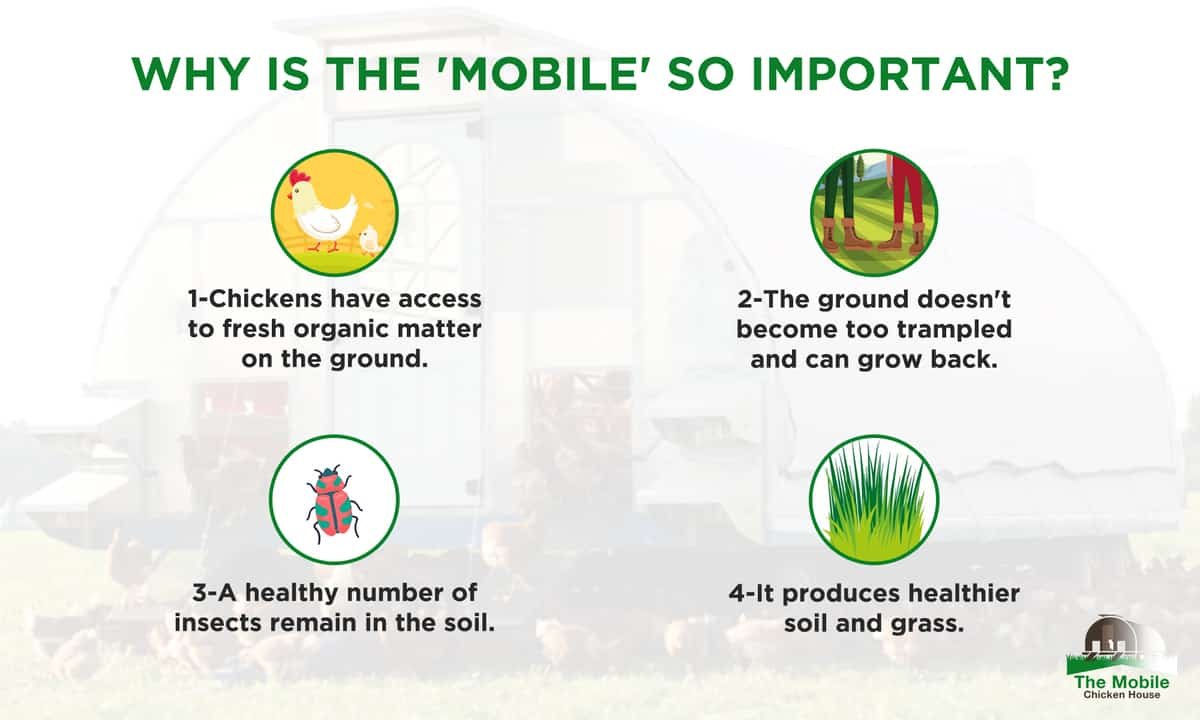
First, it gives the chickens access to fresh organic matter to forage from the ground. Mobile chicken houses are still equipped with feeding systems, but the more organic matter the chickens have, the healthier they are!
Second, it keeps the ground and grass from becoming too packed down or trampled. Moving the chickens to another spot allows the soil to continue producing grass and organic matter without becoming barren.
Third, it allows a healthy number of bugs, worms, and insects to remain in the soil. Instead of the chickens killing off most of the insect and worm population, these critters have a chance to reproduce and maintain a healthy population.
And fourth, it produces healthier soil and grass. Not only does regular movement sustain the grass, but it also spreads out the chicken manure and allows the soil to compost it quickly. That way an excess of chicken manure doesn't harm the grass.
2. Why Egg Terms Matter
We already hinted that terms like “cage-free” or “free-range” are misleading.
These terms are regulated by the USDA, but some egg operations use the technical definitions to their advantage.
How is that possible?
To answer this question, let’s look at the definitions of four egg terms.

Cage-free:
To be considered cage-free, laying hens simply need “a building, room, or enclosed area that allows for unlimited access to food, water, and provides the freedom to roam…”
That’s right, cage-free hens are kept inside, not outside! They also only need 1.5 square feet per hen, which is pretty crowded!
Free-range:
As the name indicates, free-range chickens are allowed continuous access to the outdoors. However, they only need 2 square feet of outdoor space per hen, so it is still very crowded!
Also, just because they have access to the outside does not mean the hens take advantage of it. Since the ground is usually packed and trampled without organic matter, many of the hens remain indoors anyway, even though they doo have access to a run.
Pasture-raised:
To be considered pasture-raised chickens, there must be 108 square feet of outdoor space per bird.
This is fantastic because it means the chickens have access to a lot of outdoor room to run around.
However, like free-range chickens, the problem is the hens do not always take advantage of the space. Instead, many of them choose to remain close to the stationary chicken house where the ground is packed, and the organic matter is not as plentiful.
Mobile-pastured
Based on mobile chicken houses, mobile-pastured eggs are new to the scene and not yet defined by the USDA.
Similar to pasture-raised chickens and eggs, mobile-pastured farmers want to give their laying hens large amounts of open area and grass in which to feed and roam.
With mobile-pastured, however, the farmers are also intentional in regularly moving the chicken houses to different areas so the hens can take full advantage of the space, fresh grass, and critters.
3. How Is "Mobile-Pastured" Different from "Pasture-Raised"?
Looking at the definitions in the previous section, we see the definitions for mobile-pastured and pasture-raised are similar, but they are not quite the same.
So what are the differences?
First, you need a mobile chicken house to have mobile-pastured eggs.
Pasture-raised eggs can come from a stationary chicken house set in a field. Mobile-pastured eggs, on the other hand, require the farmer to move the chicken house to new locations regularly.
Second, mobile-pastured operations allow the hens to take full advantage of fresh organic matter.
This includes grass and natural food such as worms, bugs, and other critters. Hens follow the mobile chicken house, and this naturally provides them with fresh grass and natural feed.
Mobile-pastured hens still usually eat standard chicken feed, especially during the winter months when organic matter is low. However, the fresh organic matter around them allows the hens to eat plenty of natural food resulting in healthier chickens and eggs.
Foraging for food is also boosts chickens' mental health as it is a natural, healthy behavior for them to perform.
Pasture-raised hens, on the other hand, often stay relatively close to their stationary chicken house. As a result, the ground around the house can quickly become flattened, packed, and stripped of organic matter. This means pasture-raised hens will often have a diet completely made of standard chicken feed.
Third, mobile-pastured operations are more sustainable by allowing quick land recovery.
Instead of the hens creating large bare patches around a stationary house, the regular movement allows the grass and organic matter to grow naturally, insects to reproduce quickly, and the chicken manure to compost easily.
And Fourth, mobile-pastured operations produce healthier hens.
Even if the same feed is used in the chicken house, mobile-pastured hens are healthier because of the organic matter and critters they eat. Mobile-pastured hens also exercise more, which helps their health.
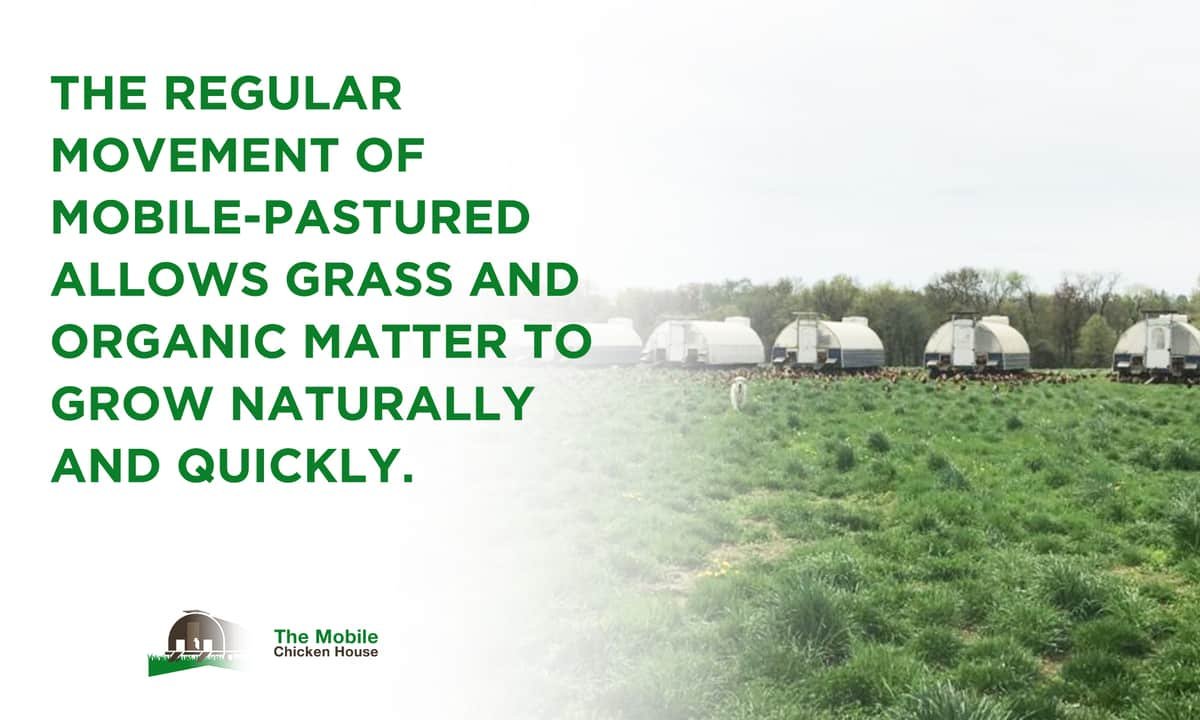
4. Advantages of Mobile-Pastured Eggs
We have already mentioned some of the advantages of mobile chicken houses and mobile-pastured eggs, but here are four of the top reasons mobile-pastured egg operations using mobile chicken houses stand out.
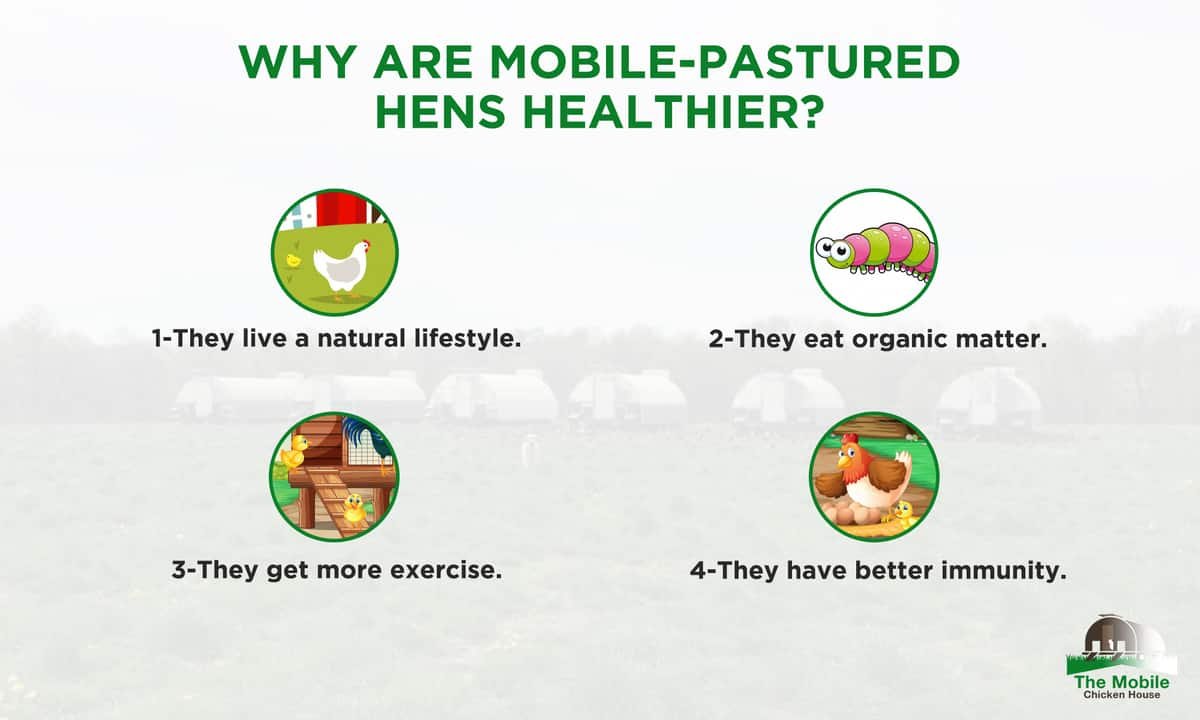
1-Healthier chickens
Mobile chicken houses produce some of the healthiest laying hens possible. This is possible for multiple reasons:
They live a natural lifestyle. Walking around outside, eating critters, enjoying nature - this is how chickens are designed to live. It boosts their mental health as well as their physical health.
- They eat organic matter. While mobile chicken houses are supplemented with feed, the hens still have their fill of insects, worms, grass, and other organic matter.
- They get more exercise. Mobile-pastured hens have the outdoors to explore right outside their mobile chicken house. Plus, moving the chicken houses regularly requires the hens to move.
- They have better immunity. Instead of being packed in a large chicken house where a disease or the avian flu can wipe out a whole flock, mobile-pastured hens have better resistance and are spread out on the land.
2-Healthier eggs
I don’t think anyone would argue that healthier chickens produce healthier eggs!
However, how are mobile-pastured eggs specifically healthier?
- Contain more vitamins and minerals. Mobile-pastured eggs have been found to have ⅔ more Vitamin A, three times more Vitamin E, and two times more Omega-3 fatty acids.
- Have less fat. Not only do they have more vitamins and minerals, but the eggs also typically have ⅓ less cholesterol and ¼ less saturated fat.
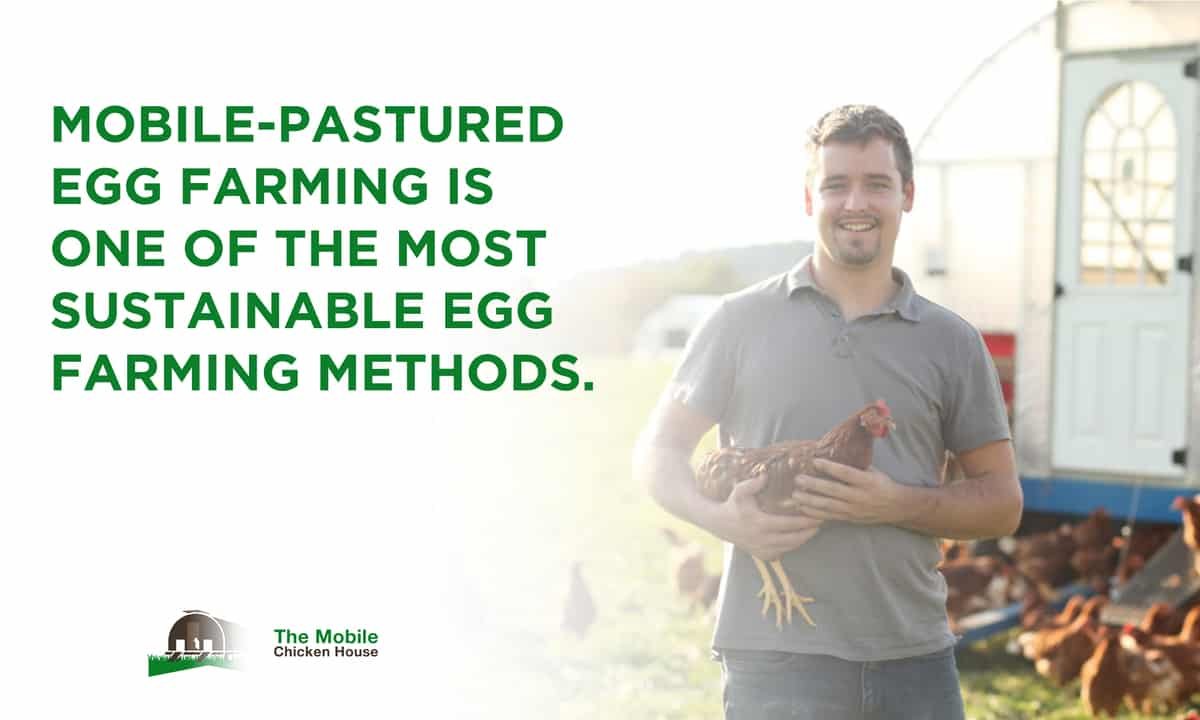
3-Sustainable farming
Using mobile chicken houses, and moving them regularly, is the most sustainable way to farm eggs for the following reasons:
- The grass is only grazed for a couple of days before the flock moves to the next location.
- Chicken manure is easily composted because it does not build up in one location.
- The land and grass do not have time to be matted down or destroyed.
- The critter population (worms, bugs, insects, etc.) is not wiped out and has time to reproduce and repopulate.
4-Humane practices
There is not much doubt or question that the large enclosed commercial chicken houses are not very humane. After all, what animal can thrive or live as intended with only 1.5 or 2 square feet of living space?
Mobile-pastured operations, however, are on the opposite side of the spectrum with some of the most humane chicken treatments possible.
How do mobile-pastured egg operations raise the bar for humane chicken treatment?
- Hens are free to roam outside the mobile chicken house.
- Hens always have access to fresh grass and organic matter.
- Hens are allowed to live as designed.
- The land is not depleted of grass, organic matter, or other nutrients.

5. Disadvantages of Mobile-Pastured Eggs
Even though pasture-raised egg operations have multiple advantages and better methods than other egg operations, they do have a set of negative factors as well, like most things.
It is important to realize many of these disadvantages are a direct result of the methods used in mobile-pastured operations.
What do we mean by this?
For example, moving the mobile chicken houses regularly requires more land and more time. While some egg farmers view these as disadvantages, other farmers see them as merely part of the cost of the egg operation.
Many farmers who have mobile-pastured egg operations also understand that the higher quality of their eggs results in higher egg prices, and this helps compensate for the extra land and time.
So what are some disadvantages of mobile-pastured eggs?
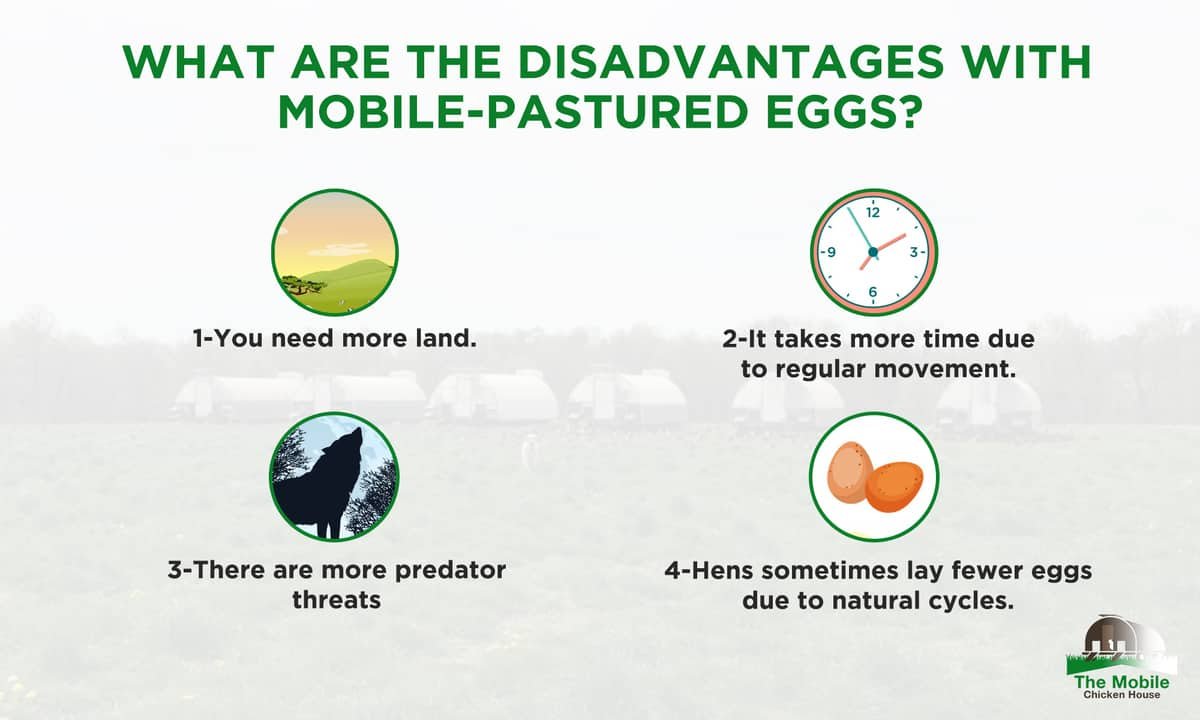
1-You need more land
Because the mobile chicken houses are regularly moved to protect the land, it naturally means you need more land for your egg operation.
It also means the amount of land you need is directly proportional to how big you want your egg operation to become.
There is no way to get around it - unlike most commercial egg operations, you cannot simply build a bigger stationary chicken house to expand your mobile-pastured operation. You need more land!
2-It takes more time
Regular movement of the mobile chicken houses also means you have to spend more labor on the operation. While you have the standard amount of time to gather the eggs, you do need to figure extra time to move the mobile chicken houses.
3-There are more predator threats
This disadvantage applies to any operation where the chickens are outside. Chickens are defenseless creatures, and almost any predator would snap one up given the chance. Some free-range and pasture-raised operations reduce predator threats by using fences and netting.
Mobile-pastured egg operations, however, are not able to use fencing or netting efficiently because of the regular movement. The best solution is to have guard dogs or other animals to protect against predators.
4-Hens tend to lay fewer eggs
This may seem a bit strange. After all, if the operation is sustainable and the hens are extra healthy, shouldn’t they be laying more eggs instead of fewer?
The answer lies in the nature of chickens.
Hens’ laying cycles are tied to weather and daylight patterns. In stationary chicken houses, the lighting systems are automated, and the temperature is kept constant. These factors ensure the hens lay the maximum number of eggs.
In mobile-pastured eggs, however, the hens are exposed to more natural temperatures, seasons, and lighting. While many mobile chicken houses do have some automated lighting features, the hens are still highly affected by the outdoors.
Sadly, this factor of mobile-pastured hens producing fewer eggs is a significant reason why many commercial egg operations stay with the standard large, stationary chicken houses, even if the eggs and chickens are not as healthy.
6. Conclusion
In an industry built around terms, many commercial egg operations have learned how to label their eggs in ways that sound healthy.
However, when the technicalities of these terms are analyzed, it becomes apparent that many egg operations are taking advantage of the terms. As a result, the quality of the eggs and laying hens suffer.
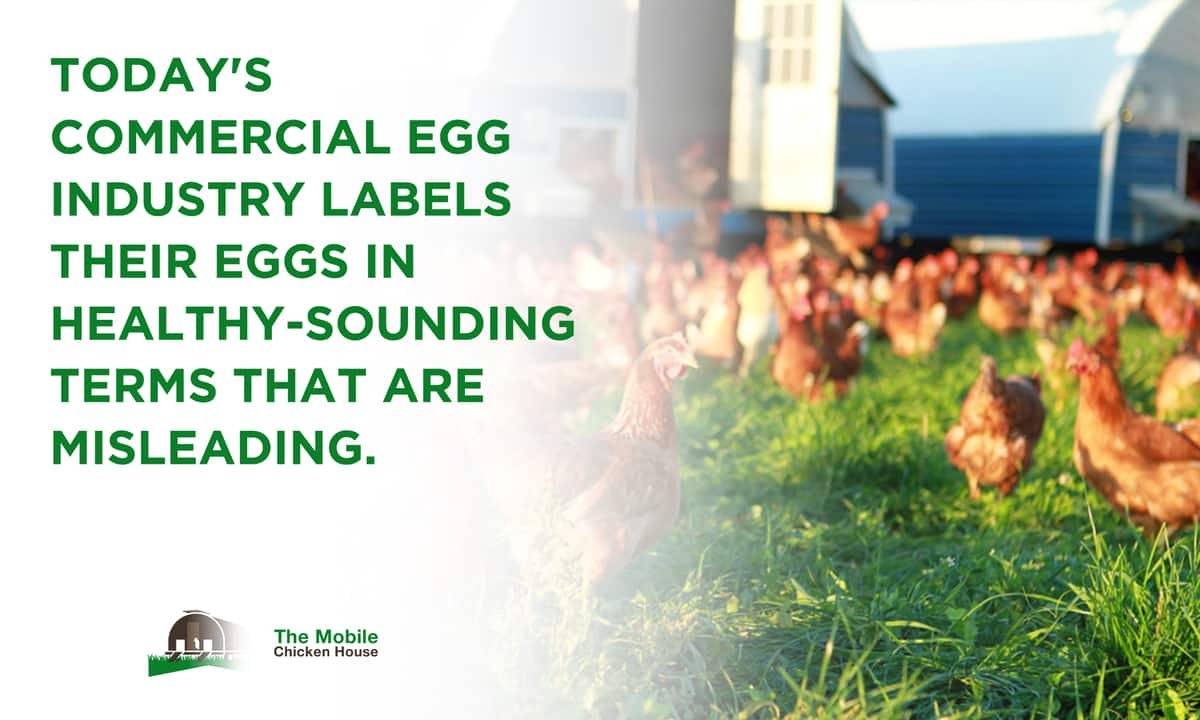
Mobile-pastured eggs, on the other hand, are entering the egg farming scene with a sustainable alternative: Using mobile chicken houses that allow the chickens to live in a natural environment, and also produce healthier eggs and hens.
At Stoltzfoos Layers, we believe egg farming operations should produce high-quality eggs, be sustainable, and be humane.
That is why we practice mobile-pastured techniques, complete with our own mobile chicken houses.
We design and sell our mobile chicken houses to make mobile-pastured egg farming as efficient as possible.
Complete with automatic feeding and lighting systems, a lightweight but durable design, and easy-gathering egg nests, our mobile chicken house will help you create an efficient and sustainable egg operation!
We also offer variations of the mobile chicken house such as mobile broiler houses, portable chicken coops, and 2-tier community nests.
If you are interested in getting a quote for a mobile chicken house, or if you have more questions about mobile-pastured eggs, then please contact us at Mobile Chicken House today!
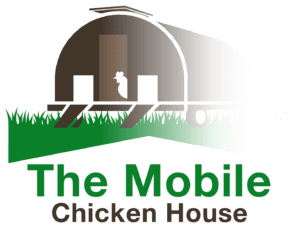
can you help producers with marketing of the eggs or assist with finding a contract buyer?
Hi Robert,
We are not currently set up to do that but will be providing some directory assistance for that at a later time to Farmers who use our houses. Thanks for checking tho. Good Markets are hard to find!
My partner likes your eggs but he is concerned about how you get the chickens back in the house each day, so they don’t get left behind . He really wants to know the answer. Looking forward to your response.
Hi Corrinne,
When the chickens are first introduced to the house, we train them to go in and out in the morning and evening for several days. Once that is done, they go in as dusk approaches on their own and are protected. It’s natural for the chicken to want this, they just need to know how 🙂 I’d suggest reading this article where we talk about it: https://mobilechickenhouse.com/training-chickens-for-mobile-chicken-house/